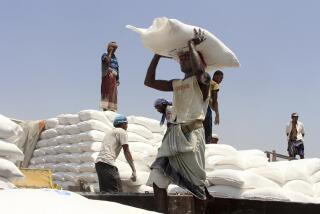Hussein’s Fund Thefts Higher Than Estimated
WASHINGTON — Saddam Hussein’s government illegally obtained more than $10 billion in revenue related to the United Nations’ oil-for-food program, about $3.5 billion more than previously thought, a congressional committee was told Thursday.
In addition, minimal efforts by European and Middle Eastern nations to track billions of dollars in other funds hidden by Hussein’s family and associates have hindered U.S. efforts to find the money, investigators told a House Financial Services subcommittee.
For the record:
12:00 a.m. April 2, 2004 For The Record
Los Angeles Times Friday April 02, 2004 Home Edition Main News Part A Page 2 National Desk 3 inches; 93 words Type of Material: Correction
Iraq funds -- A March 19 article in Section A about a congressional hearing to examine U.S. Treasury efforts to identify Iraqi funds plundered by Saddam Hussein cited a Treasury official as saying that Syria, Jordan, France, Russia, Panama, Germany, Switzerland and Luxembourg were hindering U.S. efforts to freeze accounts containing illegally obtained assets. Although a member of Congress named those countries when asking the Treasury official about challenges in identifying illegal accounts, the official responded that some countries, which he did not identify, were not being as helpful as they could be.
The oil-for-food program permitted Hussein’s government to sell oil and use the proceeds for humanitarian causes and reparations needed after the 1991 Persian Gulf War. Oil sales outside the program were forbidden under a U.N. embargo. The first oil shipments in the program were exported in December 1996.
The General Accounting Office, Congress’ investigative agency, had estimated that Hussein’s regime got $6.6 billion illegally from oil sales from 1997 to 2002. Using updated figures, the GAO told the subcommittee that the government had received $5.7 billion from oil smuggled out of Iraq and $4.4 billion in illegal surcharges on oil sales and after-sales charges on suppliers.
“Hussein and his cronies abused the goodwill of the international community to fortify and enrich the regime with kickbacks, skimming schemes and smuggling operations,” said Juan Zarate, deputy assistant secretary for the Treasury Department’s executive office of terrorist financing and financial crimes.
Although more than $4 billion in additional Iraqi government assets have been identified and frozen, a GAO report said that as much as $40 billion may have been redirected over decades into front companies, trusts and bank accounts belonging to Hussein’s family and associates.
Nations that provide insufficient cooperation in locating, freezing and redistributing the remaining billions of dollars stolen by the Hussein government could face sanctions for noncompliance, said Rep. Sue W. Kelly (R-N.Y.).
The subcommittee’s ranking Democrat, Rep. Luis V. Gutierrez of Illinois, accused the State and Treasury departments of failing to provide the GAO with necessary clearances and documents to conduct its investigation into the hidden assets.
Only recently have U.S. federal agencies become more cooperative in the attempted recovery of stolen funds, said Joseph Christoff, director of the GAO’s international affairs and trade branch.
The same cannot be said for many European and Middle Eastern nations, Zarate said.
“Varying levels of aptitude and political willingness” among the governments of Syria, Jordan, France, Russia, Panama, Germany, Switzerland and Luxembourg have handicapped U.S. efforts to freeze funds that officials believe are the illegitimate property of the former Hussein regime, he said.
The money, if left accessible to the holders of the accounts, can potentially fund the Iraqi insurgency against U.S.-led forces.
More to Read
Sign up for Essential California
The most important California stories and recommendations in your inbox every morning.
You may occasionally receive promotional content from the Los Angeles Times.










